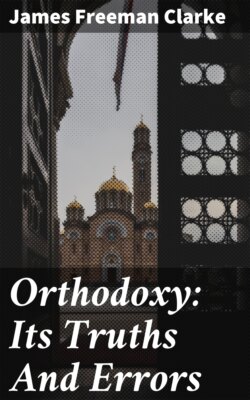Читать книгу Orthodoxy: Its Truths And Errors - James Freeman Clarke - Страница 15
На сайте Литреса книга снята с продажи.
§ 12. Error in the Orthodox Principle.
ОглавлениеTable of Contents
We are well aware of the reply which might be made, from the stand-point of Ecclesiasticism, to the historical argument just given. The Roman Catholic might answer thus: “We admit that the tree must be known by its fruits; but the tree of true Christianity is known by bearing the fruits of Christianity, not those of worldly civilization. Suppose that England is to-day richer than Italy, more powerful than Spain; is she better? Are there more piety and more morality in Protestant than in Catholic countries? In which communities do you find the most humility, simplicity, religious faith, reverence for religious institutions, fear of God? In which do you find most of sympathy, kindliness, good will from man to man? The fierce civilization of Protestantism is hard, cold, and cruel. It tramples under its feet the weak. It accumulates wealth and power; but are these Christianity? Is London or Rome the best model of a Christian city? Is [pg 036] it London, with its terrible contrasts of enormous wealth and naked want, its proud aristocracy and brutalized mob, its empty churches and illuminated gin-shops? or is it not rather Rome, poorer in material wealth and luxury, but rich in grace—Rome, with its odor of sanctity about it; its numerous churches, on which art has lavished her resources to make them worthy to be the temples of God—Rome, with its priests and monks; its religious houses, the centres of the great religious orders, whose missions have been known in the four quarters of the earth? Protestant countries may have a higher worldly civilization, more education and intelligence, more manufactures and commerce; but Catholic countries have more humility and reverence, a more habitual piety, more gentle manners. If Protestants have more knowledge, Catholics have more love.”
And we, though Protestants of the Protestants, must admit that there is some truth in this. The discipline of Romanism has repressed some amount of evil which the liberty of Protestant lands has allowed to appear. But repressed evil is none the less evil, and often works a greater inward corruption than when it is allowed to show itself as it is. We may also admit that while in Protestantism there is more of truth, and all the virtues which go therewith—such as honesty, manliness, self-respect, conscientiousness—in Catholic countries there is more of love, and all the virtues which follow it—as kindly, genial manners, ready sympathy with suffering, a spirit of dependence and trust. Still, this does not prove that there is more real Christianity among Catholics; for love which does not grow out of the sight of truth is not genuine nor healthy. Its life is weak. Protestant Christianity is an immature fruit, harsh because not quite ripe. Catholic Christianity is a fruit over-ripe, and so rotten.
Therefore we still contend that Protestantism and Orthodoxy are right in making the free and independent sight of [pg 037] truth the root of all religion. But the mistake of Orthodoxy has been in confounding truth with doctrine—the sight of the thing with the theory about that sight. From hence come the hardness and coldness of Orthodoxy. Pure thought is always cold, and ought to be. The sight of spiritual things is truth and love in one; but when we begin to reflect on that sight, the love drops out, and the truth becomes cold.
The defect of the Orthodox principle, therefore, is the confusion of truth with belief. Out of this mistake come dogmatism, bigotry, and all their natural consequences. It is therefore well, before going farther, to explain more fully this distinction and its importance.
